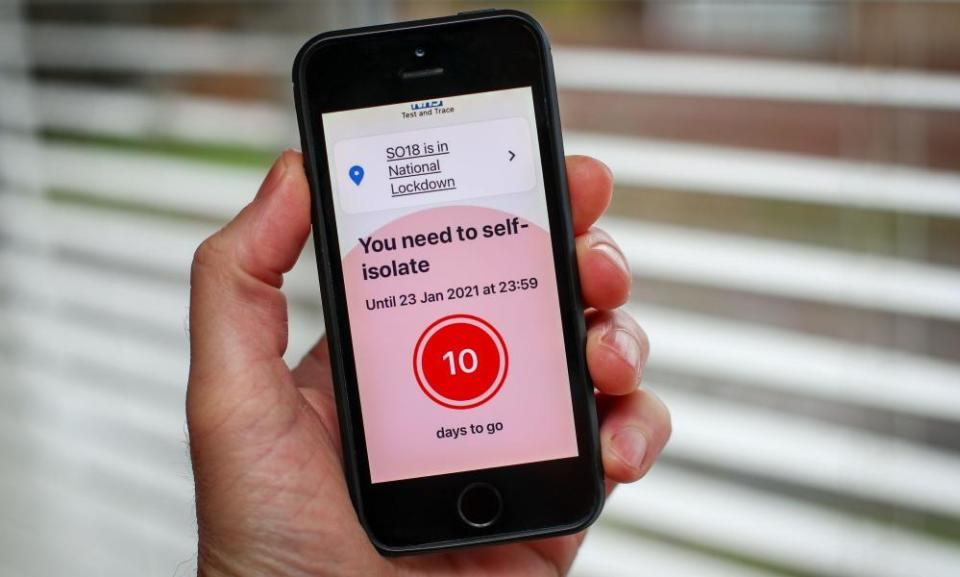Ministers to update NHS Covid app to ‘reduce disruption’

Ministers are to radically alter the NHS Covid-19 app in order to reduce the number of people instructed to isolate after they have been in contact with someone who tests positive, in the latest move to combat the numbers of people in quarantine.
From Monday, the app will instruct contacts to isolate only if they have been close to someone in the two days leading up to a positive test, rather than the current five-day threshold.
The change is a significant shift of No 10 policy, which had said there were no plans to change the way the app operated or tweak its sensitivity to address the “pingdemic”.
A Department of Health and Social Care source said the change was based on public health advice and would bring the app in line with the test and trace service. The department, however, has not published any specific new guidance or study on asymptomatic transmission to back up the change.
Labour said the tweaks to the app were a sign that ministers could not control infection rates. The shadow health minister, Liz Kendall, said: “The government has allowed infections to spiral out of control, leaving hundreds of thousands of people forced to self-isolate every day. Their response is not to drive down infections but instead quietly change the app that helps to keep us safe.
“This is yet another Covid U-turn from ministers at a time when the public need clarity and certainty – not chaos and mixed messages. It’s shambolic and they must get a grip.”
The alert is based on an algorithm that uses Bluetooth to track those who have been within 2 metres of someone with the disease for 15 minutes or more, but also check-in data at venues including bars and restaurants.
Ravi Gupta, professor of clinical microbiology at the University of Cambridge, said there was evidence to support the move. “There are reports that the incubation period is shorter for Delta, likely due to its faster replication,” he said. “I would support this move as a compromise given the current pragmatic approach to Covid-19 control in the UK.”
default
It comes amid reports that people are ditching use of the app in droves, and DHSC said it was urging people to continue to use the app now the change had been made.
The number of people contacted by the app reached record levels in the week to 21 July, according to the latest data, with more than 685,000 people told to self-isolate.
Yet evidence is growing that the public is making less use of the app – only 6.6m check-ins were recorded in total in the week ending 21 July, a 47% drop compared with the week ending 30 June.
DHSC said the update did not impact the sensitivity of the app, or change the risk threshold, and would result in the same number of high-risk contacts being advised to self-isolate.
The health secretary, Sajid Javid, said: “We want to reduce the disruption that self-isolation can cause for people and businesses, while ensuring we’re protecting those most at risk from this virus. This update to the app will help ensure that we are striking the right balance.
“It’s so important that people isolate when asked to do so in order to stop the spread of the virus and protect their communities.”
Related: End of furlough will increase UK unemployment by 150,000, says thinktank
The health department said the app had prevented thousands of potential infections, despite the outcry over the numbers isolating. Advice is due to change on 16 August, meaning those who have been fully vaccinated will no longer be required to isolate.
DHSC said the app prevented up to 2,000 cases a day in July and more than 50,000 cases overall, assuming there was 60% compliance with the app, preventing an estimated 1,600 hospital admissions.
Dr Jenny Harries, the chief executive of UK Health Security Agency, said the technology should still be used to fight the virus.
“I strongly encourage everyone, even those fully vaccinated, to continue using the app. It is a lifesaving tool that helps us to stay safe and to protect those closest to us as we return to a more familiar way of life.”
Steve Turner, Unite’s assistant general secretary for manufacturing, said the change of guidance still falls short of the union’s calls for the government to urgently rethink its decision not to exempt the automotive and steel sectors from self-isolation rules: “We simply cannot have a situation, for example, where a blastfurnace is shut down because workers are stuck at home, testing negatively daily, but forced to self-isolate,” he said.
“UK workers must not lose out because the government’s reopening of the economy is incoherent.”

 Yahoo Movies
Yahoo Movies 